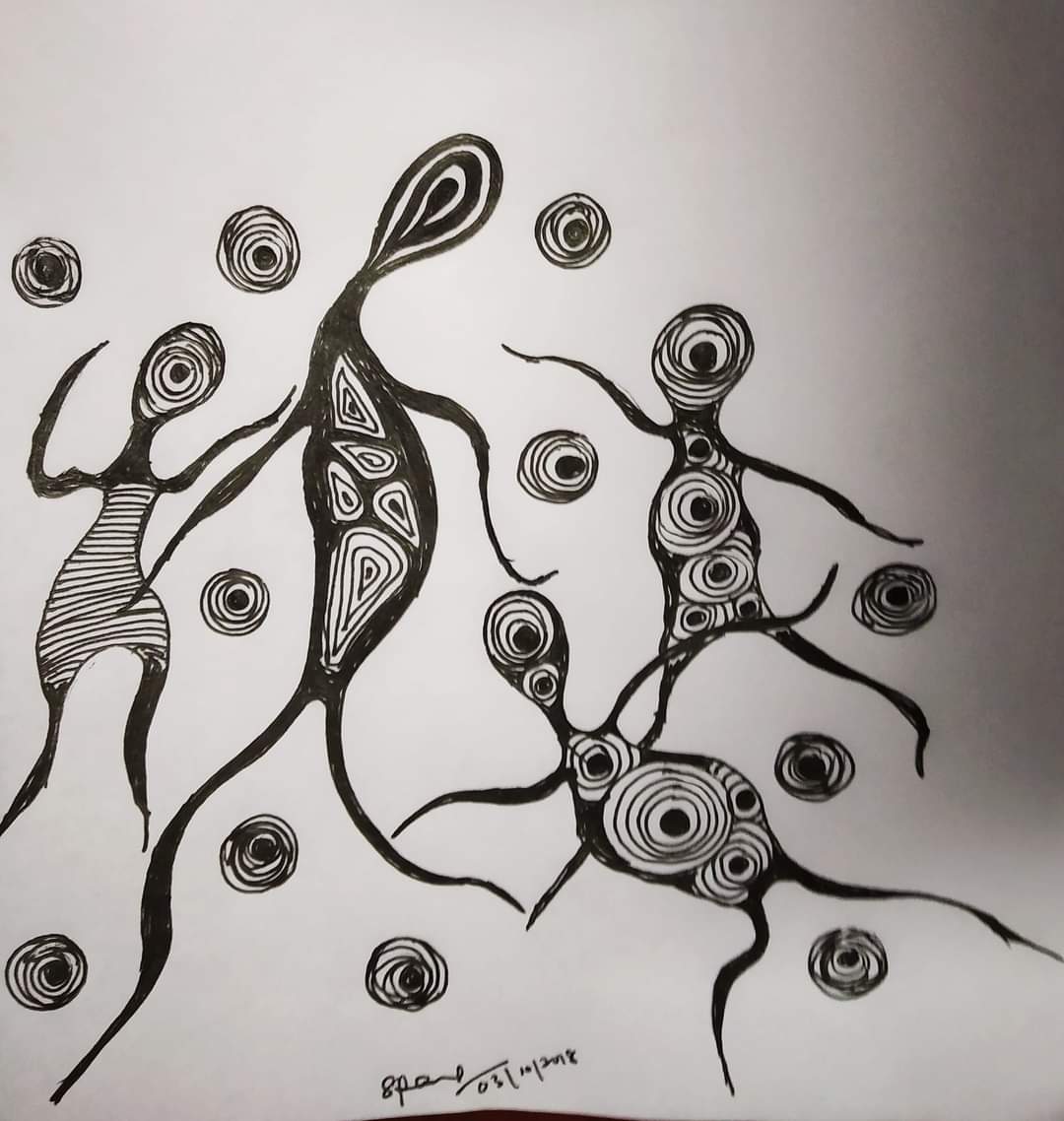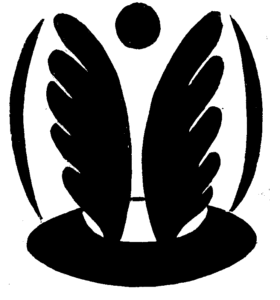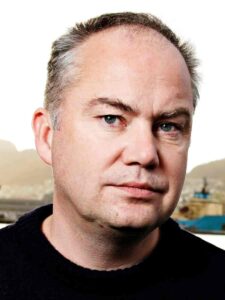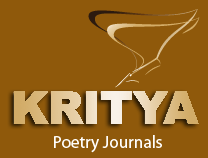
Editor’s Choice

Oyvind Rimbereid

?????????????????????????????????????????????????
Oyvind Rimbereid (born May 2, 1966 in Stavanger) is a Norwegian author and composer of lyric poetry. He has worked as an instructor at Skrivekunstakademiet in Bergen. Rimbereid holds a cand. philol. degree from the University of Bergen with high marks in Nordic languages and literature. He won the Brage Prize 2008 for his poetry collection Herbarium
These poems are published before in kritya itself (old website, no more available).
THE RAIN IN JANUARY
With a stupid bike I find myself
at a crossroads with no name
when you call
about something wrong. Wrong
in the rain
where snow should have fallen
and the cones of light from a close car
should have swept past the roundabout’s darkest grass
towards a home deep in the evening.
But everything bends inwards
in this rain that rains so wrong
against my glasses
and against the hospital mountain’s
uppermost slope
I’m unable to see.
Does a rain exist there only
for no one?
So gently the yellow bus glides
past the cement-mixing works
and the sign doorway’s three
slip roads! Like me, finally
on these reversed roads,
when you keep on saying to me
that Bente’s not to come down again.
But that only the rain is to come,
the rain that this evening rains so wrong
over every lamp post
and over this ‘no’
I tie and tie
and that will probably
not ever come completely down.
Now the image is separated from the image
and from a photo in your wallet
future flutters out of future
absent-mindedly,
as if the world was just
a place in transit,
a forgotten shawl.
For this the real has long since
given a promise about:
That everything will be turned back out again,
that everything will return
to streets with snow, dust
and sun with gleaming paint
in May, already August another year
and the features of a new face stand in the door
with such a strangely light nod
and a tricycle’s split
hand-grip under the hedge
is now past recognition,
unless the rain can do so,
which this evening probably only rains
as it once more will rain.
In memoriam Bente Gudmestad, 1968 – 2003
CAMOUFLAGE
On his newly stolen Kawasaki
our heroin-high neighbour also floats
into the spring
that now rises
through the rose-hip bush’s camouflage
we at this moment are thinking
we can vanish into,
as if seen with a cat’s eyes drugged with sleep.
Oblivion that’s total
where the war’s shattered soldier and an unsettled memory
can be borne away by a petal’s
sudden flash.
On the verandah’s
open bed we discuss the soul of the wasp
fighting in the wind
for its blind, unknown queen
and that therefore can never fly astray.
Oh, life in the perfect state!
I gaze into
your black hair. A strand of silver
grows there. Is it growing
towards its ultimately
farthest out? Or is it just waiting
for its thousand sisters?
Laburnum-gold, rhodedendron-
pollen, ‘Wild horses’
and the signal from a cell phone
that sends an arc in from a third
or fourth world (Ole?).
But here no one answers.
Here everything already exists.
In the Parminedes-
hour the hair grows
into the wasp, the wind
into the state and quietly
we hide ourselves in thought’s vacuum.
An image
that resembles an image
of a life. An image,
even with this smoke from the meat on the grill
that now glides past
and disappears like a kiss
towards the sky’s
limitless theft.
Rose I Airborne
In the Lufthansa plane on her way home from Milan
seven thousand metres above the Alps,
she rests her head against the window,
worried about her first assignment for Nortrade.
Soon she is snoozing, and half in a dream
she is already over Skagerrak.
But in the handbag under the seat
lies the rose
the Italian contact
bought for her during dinner the previous evening.
It lies protected
inside Monday¹s Milano Finanza
she’d been hoping to get to read.
Innermost, under the light pressure
of the petals,
a yellow larva still writhes.
So: airborne woman, rose and larva.
STAVANGER
In the middle of this Sunday-
time I get off. The bus with young people
youth on its way, the film by Steven Spielberg,
everything further in disappears into white, yellow wooden houses,
small gardens, the lawns green. And I older
am left behind in low sun and the music
from a radio The Beatles’ ‘Something’, trying to divide
the world, divide my life between what exists
and what people must have dreamt.
What sort of a rift is it I can see?
I am at high Eastertide, sun on the roof tiles,
cars with skis, plastic sledges. Garage doors are open,
as if an auction was about to be held, people leaving
for good, off to Canada and no name, no
story here left behind…
Today white clouds
above the city’s seven or nine highrises, two built by a council chairman,
later minister, engineer-
contractor with a heart for the heavy but safe
promises into the innermost
of this world.
Are these streets where the dream of the past
has become real, is finally welcomed? Am I standing
among houses where all images of the
future have been taken home? Beneath a southwest-lit
sky lies the city, and outside mile after mile of
fields, stones, bare rock-face
the sea.
Practically everything I’ve experienced, I’ve experienced here
or in a geography not far removed. The landscape
and the city crisscrossed in each other
and in me and my friends. As if all of
us were enclosed in
all this openness.
But nothing outside?
The hard times of the twenties and thirties, the flight from hunger
home to new hunger, the enthusiasm for the Nazis
suddenly over. Later the hidden wars, the silent
slow ones, at the end of my street communists lived
and the many who were far too thirsty
in narrow highrise wooden houses, the origin
of the name given them, ‘The Nigger’
now forgotten.
I don’t remember either,
or can only just remember
someone playing punk
two blue car lights, the wound in a hand…
It is as if the rays of history
have stumbled, have fallen back
into their first gleam!
How still the streets are
on such holidays. The houses wait
for those walking from room to room, talking on the phone,
watching TV, thinking about work, about the following
day, a following year.
We’ve got what we need,
everything…
except a zoo! where an otter, yes an otter
would have twisted its glistening body through the cool water
of the pool, from the secret hidden depths, a dark shadow
up and on, a piercing Red Indian gaze into ours…
Like the Jesus we once
loved (and who one day slid in the oil). But
who we never loved too much, never as strongly
heavily, painfully that the light of the world wasn’t white
enough her! Our song, never as loud that
it gripped us, ripped us up
or down. Our light, humming song
just as far above the rage of all dread
the impossible song of all madness, humming away
and home to the mild, friendly song of
our familiar streets.
What song will one day sound in these streets?
Will there be the street fighting of slumps and downsides
and despair? Among us? Stretched out
on the carpet of a total market economy,
on which we are borne, rocked each one and then free in
further and further in
and finally out.
In its wild flapping round the Våland tower, on the heights
high above the city, where we saw everything as from a roundabout,
Hundvag, Storhaug, Hillevag, Ullandhaug
and then the fields, the coast, before once more the city,
Eiganes, Hundvag. Winds to throw
yourself down in
to fall asleep in. In its wild flapping we saw them
come, as from an old darkness beneath the tower,
snowing through the April evenings we saw them disappear
away from our stretched sheets,
away and out towards all corners of Stavanger
the black, mysterious souls
we evening after evening wished to catch, we evening
after evening didn’t manage to catch…
We live in the outermost, uppermost
suburb. But of what city?
In the summer a school band still
crosses the North Sea, with open night-faces
towards the yellow flaring light of the oil-rigs. To Newcastle
Edinburgh, sometimes even right into Sheffield, to our half-brothers
from before 1971 and the warm oil-era.
But over there, scarcely visible among the cranes
at the empty shipyard,
an angel ascending with wings of steel,
the inscription: ‘You Stupid, Why Visit Us: The Horror!
The Horror!’
Still we are on our way
it feels like,
on our way into our own image into our good
our better best years. The supply boat in the harbour makes
past the NATO frigate furthest out. The pennants
of the Atlantic Hotel flutter in international
colours. And the grass in the gardens grows, grows
and grows into the fences.
We live in the innermost
figure. It doesn’t prevent me, it hardly prevents
anyone any longer, this city in these middle
years. I write Easter 1998, the crocuses
are opening. If I now know what is speaking
here? If I now know what is not speaking
here? What will never be allowed
to speak here?
We are at high Eastertide. The evenings
are getting lighter, a white flickering over the grass
and around the graves where my grandparents from the sea lie
and my mother, father, brother
and I
one morning will disappear
forever and again into April’s light
evenings. The same lightness of light
and too as if the rain might fall,
and the darkness,
obliquely in like the rain
above our roofs and our furniture
and above the anoraks
that hang ready.
Far from all fractions
the yellow paint gleams on the wall, a rake is drawn
through the gravel, the cat on its way across the lawn
looks at me.
And I turn round into a yes
and into a no
while the bus disappears
in among hundreds of thousands of windows ajar,
ajar for those who soon will be returning home.
But what kinds of faces will they come with then?
With what kind of change of name will they
carry their backpacks home
to new days?
At night the fridge drones
far from our dreams.
I still remember my first knife,
‘Made in West Germany’.
It is high Eastertide, there is still snow
on the mountains we can see far away to the east,
we are waiting
we are waiting

